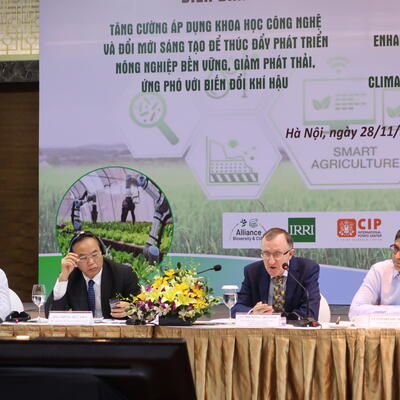
DFID/UKAid fund British, ILRI, African genetics research to advance African livestock development
ILRI geneticist Olivier Hanotte carries out work on chicken samples in Oromia, Ethiopia (photo credit: ILRI/Camille Hanotte).
‘. . . International Development Secretary Penny Mordaunt announced the new UK aid research, which is being carried out by international organisation, CGIAR, during a joint visit to the University of Edinburgh with Bill Gates.
‘The Bill & and Melinda Gates Foundation is an important partner in international research and announced further investment in UK based livestock R&D during the visit. . . .
Unpredictable flooding, plant diseases and drought are threatening the lives and livelihoods of millions of farmers in Africa who struggle to grow enough crops to put food on the table—the urgency of the task is clear.
That’s why UK aid is supporting British scientists to develop new crops that are more productive, more nutritious and more resistant to droughts and flooding, as well as creating new medicines to protect cattle and poultry from devastating disease.
This transformative UK aid research will not only stop diseases from destroying the livelihoods of African farmers, it will also help control livestock diseases on British farms.
—UK International Development Secretary Penny Mordaunt
‘New ideas, cutting edge science and innovative partnerships with organisations like the Bill & Melinda Gates Foundation will help Britain create a healthier, more secure and prosperous world for us all.
At the University of Edinburgh, scientists are also leading ground-breaking work on diseases which cause huge economic losses for African farmers, including Animal African Trypanosomiasis (AAT), a disease which kills over 3 million cattle a year, has been estimated to cost over $4bn a year in total to African economies and can cause sleeping sickness in people.
‘Scientists believe that within the next five years—and for the first time in over 40 years—a new drug will be available to treat AAT. UK scientists have uncovered new molecules, which can be developed into an effective treatment for this devastating disease—with the aim of wiping it out.
‘This research could also help British farmers who face similar threats in the future, by identifying responses to diseases before they reach the UK.
‘UK scientists are also working to reduce the impact of many diseases that can be passed to people from animals such as Porcine Cysticercosis—the most common cause of epilepsy in developing countries. The scientists are currently involved in testing the effectiveness of a new vaccine to tackle this disease, which will help protect the health of families and communities.
‘During the visit Ms Mordaunt also announced plans to develop the Centre for Tropical Livestock Genetics and Health, which is based in both Edinburgh and Nairobi.
The centre uses the most recent scientific advances in genetics and genomics that are being used by farmers in the UK and apply these to help smallholder dairy and poultry farmers in sub-Saharan Africa.
‘The campus at the University of Edinburgh, which hosted the visit, has a number of organisations involved in this work including; The Roslin Institute and the Royal (Dick) School of Veterinary Studies. Scotland’s Rural College and GALVmed are also located nearby. Scientists working here have been responsible for many of the advances in farming techniques now used both here in the UK and throughout the developing world.
‘This research underlines the UK’s commitment to tackling climate shocks, protecting the environment and increasing resilience—all of which are themes at the Commonwealth Heads of Government Meeting in London in April 2018.
Notes to editors
‘DFID will support CGIAR with funding of £90m over 3 years. ‘CGIAR’ was originally the acronym for the ‘Consultative Group on International Agricultural Research’. In 2008, CGIAR redefined itself as a global partnership. To reflect this transformation and yet retain its roots, ‘CGIAR’ was retained as a name. CGIAR is now a global research partnership for a food-secure future. The role of CGIAR is to deliver new agricultural technologies to support food and nutrition security and growth. Access to high-yielding, drought, heat and disease-resistant crops and livestock underpins the livelihoods and incomes of poor farmers and is essential to combat hunger and reduce the risks of crop failure.
‘Technology developed by CGIAR was at the heart of the green revolution, tripling yields and lifting millions out of poverty and hunger. CGIAR-developed varieties of the 10 main food crops are now grown on over 200 million ha in developing countries.
‘This new funding will support the development and deployment of: crop varieties that are climate resilient, more resistant to heat, drought and flooding; crop varieties that are more nutritious, with elevated levels of essential micronutrients; agronomic practices that boost resilience and reduce the use of costly inputs; new livestock varieties, diagnostics, vaccines and medicines, to reduce the risks faced by livestock farmers.
The Centre for Tropical Livestock Genetics and Health (CTLGH) will receive £4 million through funding by DFID. It is a joint venture launched by three partners—the Roslin Institute of the University of Edinburgh, Scotland’s Rural College (SRUC) and CGIAR—International Livestock Research Institute (ILRI), who have created a new, multidisciplinary Centre for Tropical Livestock Genetics and Health, with two main nodes, one in Edinburgh and one in Nairobi.
‘The Centre will mobilise the most recent scientific advances in genetics and genomics that have led to substantial gains in livestock productivity in temperate zones and apply these to improve livestock productivity in tropical environments, for the benefit of smallholder dairy and poultry farmers in sub-Saharan Africa.’
Read the whole news release from the Department for International Development and The Rt Hon Penny Mordaunt MP: UK aid backs ground-breaking British research into ‘super-crops’, 26 Jan 2018.
Visit the website of CTLGH and related news from the ILRI ‘LiveGene’ program helping to lead the work of this new centre.
See news clippings on this:
BBC: Gates to back Edinburgh-based farm research projects, 26 Jan 2018.
Thomson Reuters Foundation: ‘Super’ crops and cows—Bill Gates, UK inject cash into farm science, 26 Jan 2018.






















